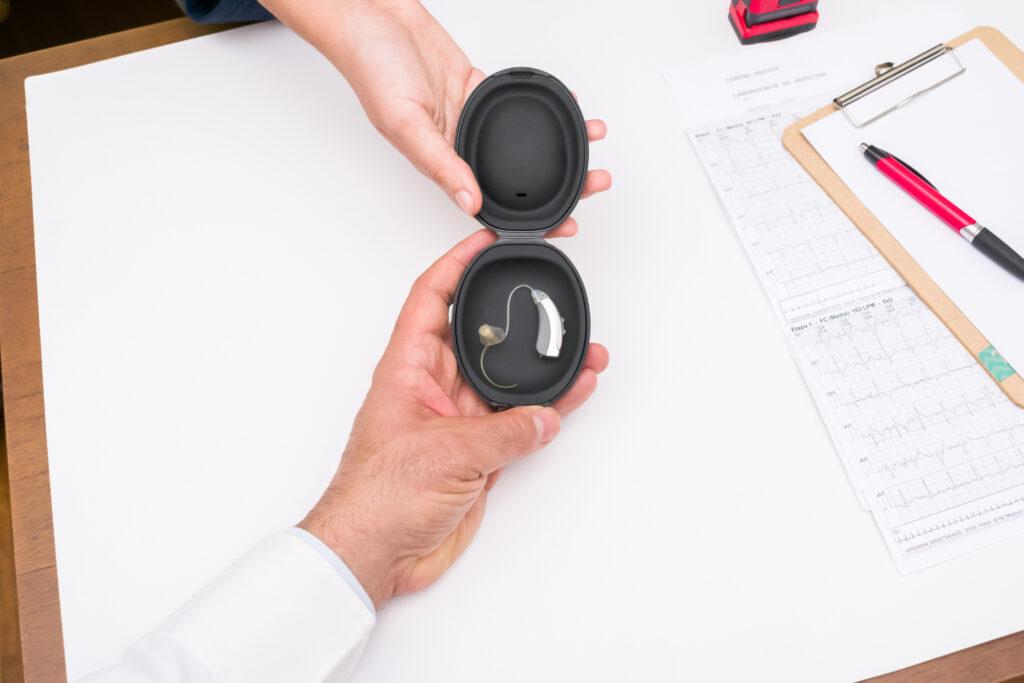Hearing aids are small and delicate, so deciding how you’ll keep them safe is one of the most important things you can do. Here are three tips on how to store your hearing aids safely to help protect them from loss and damage.
1. Develop a routine.

Because of their small size, hearing aids are easy to misplace. It’s common for people to set them down and forget where they left them. The best way to prevent this is to develop the habit of putting them in the same place every time you take them off. Here are a few suggested locations:
- On your dresser
- On your bedside table
- In a drawer
- In a case in your bag or purse
Tip: Some smartphone-compatible hearing aids have a “find my hearing aids” feature, which can help you locate your hearing aids if you misplace them. Check your hearing aid app to see if you have this feature.
2. Store hearing aids securely.

Wherever you choose to keep your hearing aids when not in use, make sure the location is protected from potential hazards. Store them in their appropriate charging case, padded case, jewelry compartment, drying cup, or hearing aid dryer to protect them from dust, moisture, or other damage.
If you have pets or small children in your home, you may need to place your hearing aids out of reach. Pets can chew or swallow hearing aids. Dogs may be attracted by the smell of your skin oils or high-pitched sounds emitted by your hearing aids you may not even hear. Cats may see your hearing aid as a toy.
Small children are also naturally curious and can break a hearing aid by playing with it. Plus, a hearing aid presents a choking hazard if swallowed. Hearing aid batteries are dangerous as well. In case of ingestion, you should contact a doctor immediately and call the National Button Battery Ingestion Hotline at 1-800-498-8666.
Never store hearing aids in these locations:
- Refrigerator or freezer
- Bathroom
- Car
- Direct sunlight
3. Keep your hearing aids dry.

Even though most hearing aids are manufactured with a protective nano-coating that helps protect against water, moisture is still their biggest enemy. If you live in a humid environment, it’s a good practice to store your hearing aids in a special container to dry them when not in use. There are different types of hearing aid dryers:
- Dehumidifier: This is usually a container with a desiccant pad or gel that draws moisture out of hearing aids; it can usually be purchased for under $20
- Hearing aid dryer: A more robust solution is an electronic case with drying and sanitizing functions, which is ideal for more humid areas; a dryer is generally available for $50–100
If your hearing aids get wet, dry them as thoroughly as possible with a soft cloth before placing them in your dehumidifier or hearing aid dryer. If you don’t have one, a quick fix is to place your hearing aids in a container filled with uncooked rice, which will help draw moisture out of the electronic components. Never use a blow dryer or put them in the microwave or toaster oven to dry them out. Heat or microwave radiation will destroy the delicate electronics.
Use these tips to help keep your hearing aids dry:
- Don’t store them in a bathroom cabinet or other location with high humidity
- Remember to take them off before you shower or wash your face
- When exercising, wear a sweatband to absorb excess moisture or remove your hearing aids if they’re not necessary for the activity
Good habits and safe storage practices will help your hearing aids continue to serve you well for many years to come. We’ve also got more tips and tricks to help you make the most of your hearing aids.
Learn how TruHearing can help with all your hearing aid needs.
